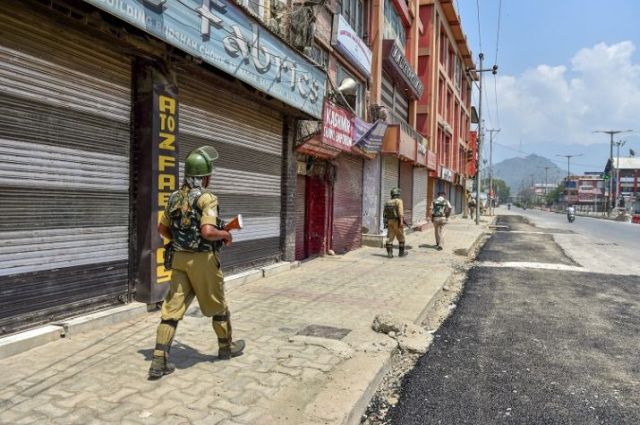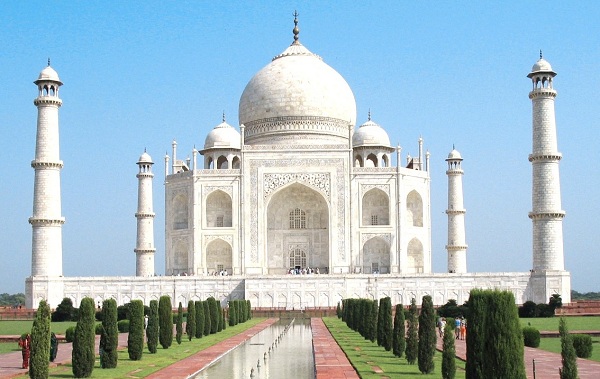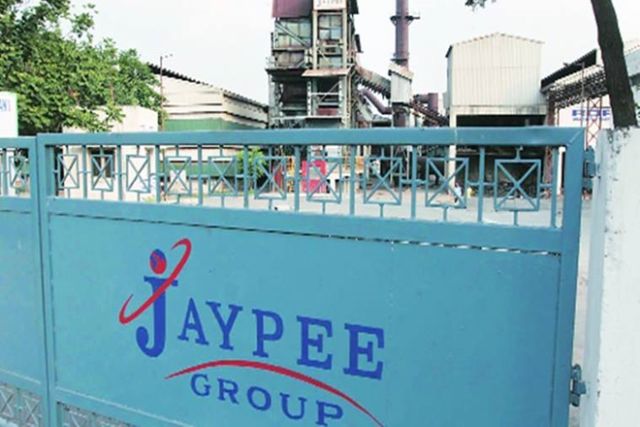
by Editor | May 25, 2021 | News, Politics
 Sringar : Authorities on Monday imposed a shutdown on Srinagar and some other parts of the Kashmir Valley following rumours that the Supreme Court has scrapped Article 35A, police said.
Sringar : Authorities on Monday imposed a shutdown on Srinagar and some other parts of the Kashmir Valley following rumours that the Supreme Court has scrapped Article 35A, police said.
Jammu and Kashmir Police issued a statement here, saying: “Some sections of the media have circulated news regarding scrapping of the Article 35A. The news has been refuted as baseless. People are requested to maintain calm and not to pay heed to these rumours.”
As a precaution, shops, public transport and other businesses were shut.
Clashes between stone pelting protesters and the security forces were also reported in Anantnag district and other places.
Petitions challenging Article 35A which gives powers to the state legislature to define permanent residents of Jammu and Kashmir and their privileges, has been listed for hearing by the Supreme Court on Friday.
Reports from Delhi said a fresh petition seeking scrapping of the Article is being filed in the apex court on Monday which fuelled the rumours.
Governor Satya Pal Malik has engaged Additional Solicitor General Tushar Mehra to defend the Article.
Authorities have decreased the speed of mobile internet across the Valley.
Separtists have called for a general shutdown on Friday and Saturday to highlight the public support for the Article.
—IANS

by Editor | May 25, 2021 | News, Politics
 New Delhi : The Supreme Court was told on Thursday that reservation in promotion is impermissible and unconstitutional, and it is the responsibility of the state to strike a balance while giving reservation in promotion to Scheduled Castes and Scheduled Tribes.
New Delhi : The Supreme Court was told on Thursday that reservation in promotion is impermissible and unconstitutional, and it is the responsibility of the state to strike a balance while giving reservation in promotion to Scheduled Castes and Scheduled Tribes.
Those opposing the reservation in promotion told the five-judge constitution bench headed by the Chief Justice Dipak Misra that there cannot be reservation without balance.
“The state is reposed with the responsibility to strike a balance and not just enforce reservation,” pleaded senior counsel Shanti Bhushan and Rajeev Dhavan on behalf of the respondents opposing the Centre’s plea for reconsideration of 2006 judgment by which top court had laid down the criteria for reservation in promotion for SC/ST.
Spelling out the foundational features of the 2006 Nagaraj judgment, Dhavan said that the creamy layer was a principle of equality and equality has to be substantive and not just formal.
He told the bench that Nagaraj judgment, for ensuring that equality as basic structure is not violated, had laid the pre-condition of compelling reasons — backwardness, inadequacy of representation — and overall administrative efficiency which the government has to satisfy before embarking for reservation in promotion.
Defending the Nagaraj judgment, Dhavan said it can be revisited only if there is foundational defect in it.
“There was no fatal flaw in Nagaraj judgment,” Dhavan told the constitution bench.
Earlier, arguing for another respondent, senior counsel Shanti Bhushan said that reservation is for a class of people who are backward and not for an individual in a cadre in government job.
Finding no infirmity with the reservation at the entry stage, Bhushan said that once a person is collector, Income Tax officer or holding any such or equivalent position then any reservation in promotion would be for an individual, as at that level no one is backward.
Reservation in government jobs at entry point would be for the “class of backward people”, but subsequent intra-cadre reservation would be for an individual, as having occupied a position in government service he cannot be described as backward.
Earlier, seeking reconsideration of the top court decision in Nagaraj judgement, senior counsel Indira Jaising said that the validity of the constitutional provisions could not be tested on the grounds of “compelling reasons — backwardness, inadequacy of representation and overall administrative efficiency”.
Contending that there could not be any “quantitative exclusion” of SC/ST, Jaising said that it was only the “100-point roster system that would ensure that nobody (in reserved category) would exceed the ceiling limit of quota”.
Jaising appeared for an apex body of SC/ST employees serving in the government.
By its 2006 judgment, the top court had upheld the validity of Constitution’s 85th Amendment by which Article 16 (4A) — providing for reservation in promotion with consequential seniority” was inserted in the Constitution.
The reservation in promotion was to come into effect retrospectively from June 17, 1995.
The judgment that was pronounced on October 19, 2006, had said: “… State will have to show in each case the existence of compelling reasons, namely backwardness, inadequacy of representation and overall administrative efficiency, before making provision for reservation in promotion.”
Senior counsel Dhavan will resume his arguments on August 29 – the next date of hearing.
—IANS

by Editor | May 25, 2021 | Corporate, Corporate Governance, News, Politics
 New Delhi : Slamming both the Central and Uttar Pradesh government for the neglect of Taj Mahal, the Supreme Court on Thursday wondered what if Unesco drops the 17th century Mughal monument from its list of world heritage sites.
New Delhi : Slamming both the Central and Uttar Pradesh government for the neglect of Taj Mahal, the Supreme Court on Thursday wondered what if Unesco drops the 17th century Mughal monument from its list of world heritage sites.
“It is a world heritage site. What will happen if Unesco say that we withdraw the world heritage title,” asked the bench of Justice Madan B. Lokur and Justice Deepak Gupta.
Asked if the authorities concerned have filed the management plan for the protection and preservation of the heritage site, Justice Lokur said: “It is very very difficult to understand something that is happening. Something is said on affidavit, something is said orally and something otherwise. It is unacceptable.
Coupled with this, the court also wanted to know which was the authority responsible for the protection and preservation of Taj as it found that the three affidavits filed before it were by the Uttar Pradesh Tourism Department, second by the Union Environment and Forest Ministry and third by some other authority.
“Somebody has to take the responsibility. Who has to take the responsibility for Taj – either Centre or Uttar Pradesh government with an identifiable authority?” the bench said.
As senior counsel A.D.N.Rao told the court that the Archaeological Survey of India was responsible for the Taj, the court expressed surprise that the it has been kept out of the consultation process for preparing the draft vision document for the protection and preservation of the Taj.
Ordering that a copy of the draft vision document be made available to the ASI and asking its to share it with INTACH, Agha Khan Foundation, ICOMS and other similar entities who have expertise in protecting and restoring the historic monuments, the court also directed the UP government to give a copy of the vision document to petitioner M.C.Mehta for his comments.
Sharing the court’s concern on the possibility of Unesco dropping Taj from the list of world heritage sites, Attorney General K.K. Venugopal told the court that the task involving the preservation and protection of Taj and other adjoining monuments including Agra Fort, Fatehpur Sikri and Sikandra fort at Mathura Ais massive and has to be carried by way of short term, medium and long term plan.
He told the court that short term plan itself would take two years to complete.
At the outset of the hearing, Justice Lokur took exception to Uttar Pradesh government filing the draft vision document asking if the state government expected the Court to “correct it.”
The court was told that the Taj Trapezium Authority was responsible for executing the larger plans fior the protection of heritage monument, Justice Lokur said had it been doing its job, things would not have come to such a pass.
The court directed it be told “categorically and unequivocally” who is responsible for the TTZ.
“Whether it is Union of India, then which Ministry, if it is Uttar Pradesh government, then which Ministry,” said Justice Lokur, adding that “we are in a situation where left hand does not know what right is doing”.
TTZ is an area of about 10,400 sq km spread over the districts of Agra, Firozabad, Mathura, Hathras and Etah in Uttar Pradesh and Bharatpur district of Rajasthan.
As the Attorney General referred to the draft vision document involving multi-pronged approach to preserve and protect the heritage monument, Justice Lokur confronted him with an affidavit by the Uttar Pradesh government which said that there were 1,167 polluting industries in the area.
Venugopal then sought to clarify that all of them were being operated on clean fuel and UP government’s standing counsel Aishwarya Bhati said it was just the nomenclature to describe them which is in use for long.
This drew the court’s ire.
“They are polluting industries, your affidavit says but you are saying that they are not polluting but by nomenclature they have been described so,” said Justice Lokur.
“There is something wrong with your English or there is something wrong with ours,” he added.
—IANS

by Editor | May 25, 2021 | Opinions
 By Amulya Ganguli,
By Amulya Ganguli,
Although the Supreme Court has suggested that a law be enacted specifically to deal with the “new normal” of lynchings, it will be advisable to widen the scope of the legal remedy to include all forms of mob violence, even if doubts are likely to remain about the efficacy of the proposed solution.
The wider ambit should include the killings and acts of intimidation of the kind which took place during the recent panchayat elections in West Bengal and the sporadic targeting of rivals by the followers of the Communist Party of India-Marxist and the Sangh parivar in Kerala.
Politics is the direct cause of these instances of violence in the two states while the lynching of beef-eaters and meat traders in other parts of the country underlines the fascist trait of targeting those who are seen as “aliens” who are violating the culinary fetishes of the ruling dispensation.
On the other hand, the killing of the suspected kidnappers of children is apparently the result of an atmosphere of anarchy which has come to prevail in the absence of a stern enforcement of law and order — a lacuna which the judiciary wants to be rectified to instill fear in the offenders.
It is this last point which offers a clue as to what has gone wrong. Since the miscreants are generally no longer afraid of the law-enforcing machinery, will a new law make any difference?
As is known, conscientious officials have always known that no incidents of violence, including communal riots, can continue for any length of time unless there is political instigation. If the police have clear orders to crack down on the unruly elements at the first sign of trouble, an outbreak of lawlessness can be quickly snuffed out.
The problem, however, is that not only do the trouble-makers almost invariably have political backing, the police are also told by their political masters to let them vent their ire — at least till it becomes politically damaging because of media coverage.
As the violence during the panchayat polls in West Bengal made it clear, the goons could not have gone around carrying lethal weapons without caring for the television cameras to terrorize the voters and opposition politicians unless they were sure that the ruling party would stand by them.
It is the same with regard to what has been happening in the case of the gau rakshaks (cow vigilantes) or the group which opposed the screening of the film, “Padmavat”. Those indulging in the murderous acts in front of cameras, or threatening to bury alive an actor and the producer in a television show, would not have been so brazenly defiant if they were not sure of being on the right side of the powers-that-be.
Although influential ruling party politicians have formally berated the self-appointed protectors of cows, such admonition has had little effect on the ground if only because the large contingent of saffron trolls have unhesitatingly continued to pour their venom on the minority community, emphasising the large measure of support which the vicious “activists” enjoy.
In addition, their confidence could not but have been boosted by the garlanding of a group of killers by a Union minister or the comparison which a sadhvi (Hindu nun) in Rajasthan drew between another such murderous group and Bhagat Singh, the great freedom fighter.
A law against them, therefore, is likely to remain largely ineffectual in circumstances such as these where the “saviours” of cows have a special place of distinction among the denizens of the corridors of power.
It is obvious that behind the present fraught conditions is the deterioration in the calibre of politicians whose only objective is to remain in power even if it means bending the administrative system for their partisan advantage by undermining the autonomy and professionalism of the various services, especially the police. The latter are perhaps the most culpable as they have patently become pliant tools in the hands of the politicians.
It cannot be gainsaid, therefore, that a new law will do little other than adorn the statute book. It is in this depressing context that the Supreme Court’s 2006 judgement has to be recalled, which called upon the centre and the state governments to insulate the police from politicians.
Needless to say, no government has paid any heed till now to the judiciary’s diktat and is unlikely to do so in the future since abiding by it would rob them of the “right” to misuse the vast powers which the law vests in the rulers.
As long as the police remains a caged parrot, to quote what the Supreme Court said about the supposedly “autonomous” Central Bureau of Investigation, the lynch mobs have little to fear.
(Amulya Ganguli is a political analyst. The views expressed are personal. He can be reached at amulyaganguli@gmail.com)
—IANS

by Editor | May 25, 2021 | News
 New Delhi : With Jaiprakash Associates Ltd (JAL) failing to deposit Rs 1,000 crore, the Supreme Court on Wednesday asked the real estate firm to pay Rs 600 crore to pay back to the home buyers who have opted for a refund.
New Delhi : With Jaiprakash Associates Ltd (JAL) failing to deposit Rs 1,000 crore, the Supreme Court on Wednesday asked the real estate firm to pay Rs 600 crore to pay back to the home buyers who have opted for a refund.
A bench of Chief Justice Dipak Misra, Justice A.M. Khanwilkar and Justice D.Y. Chandrachud asked senior advocate F.S. Nariman, appearing for JAL, to take instruction from the company on depositing Rs 600 crore, instead of RS 1,000 crore, with top court’s registry.
The bench said that after the amount is deposited by the JAL, it would ask the National Company Law Tribunal (NCLT) bench at Allahabad to expeditiously decide the company’s plea on revival or restructuring of Jaypee Infratech Ltd (JIL), a subsidiary of holding company Jaiprakash Associates Limited.
The bench on May 16 had asked JAL to deposit Rs 1,000 crore, in addition to Rs 750 crore already deposited, with its registry by June 15, to refund the principal amount to the hassled home buyers and that on submitting the amount, the liquidation proceedings against JIL would remain stayed.
However, failure to deposit the amount would result in the start of insolvency proceedings against JIL, the bench had said.
On Wednesday, the court was informed that Rs 1,000 could not be deposited. Rs 750 crore has already been deposited with the top court and another Rs 600 crore would be required to pay the principal amount to home buyers, the court was told.
To this, the bench asked the JAL to “establish its bonafide by paying the money”, and directed it to inform by July 13, the next date of hearing, about the company’s stand on depositing Rs 600 crore with it.
JAL had sought, in apex court, a direction for restraining the NCLT bench at Allahabad from proceeding further with the insolvency proceedings.
Earlier, the bench had sought from JAL details of its housing projects in the country and said that the home buyers should either get their houses or their money back.
The court was hearing the pleas of home buyers contending that around 32,000 people had booked flats and were paying instalments, but were not left in the lurch after the NCLT, on August 10, 2017, admitted the IDBI Bank’s plea to initiate insolvency proceedings against the debt-ridden company for allegedly defaulting on a Rs 526-crore loan.
—IANS

 Sringar : Authorities on Monday imposed a shutdown on Srinagar and some other parts of the Kashmir Valley following rumours that the Supreme Court has scrapped Article 35A, police said.
Sringar : Authorities on Monday imposed a shutdown on Srinagar and some other parts of the Kashmir Valley following rumours that the Supreme Court has scrapped Article 35A, police said.



